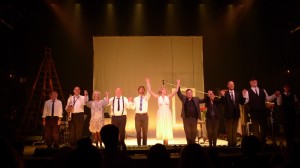Victoria Premiere
Music by Gavin Bryars
Libretto by Marilyn Bowering

“It was wonderful to be around her, she was simply overwhelming. She had so much promise. It seemed to me that she could really be a great kind of phenomenon, a terrific artist. She was endlessly fascinating, full of original observations…there wasn’t a conventional bone in her body.”
Arthur Miller, whose words those are, was Marilyn Monroe’s third and last husband – their marriage, which lasted five years, was also Monroe’s longest; Miller also wrote the screenplay of her final movie, The Misfits. Marilyn Forever, which premiered on Friday night, is an exploration of the myth that is Marilyn. In a variation of the dying-person’s-life-flashing-before-them, the opera opens with the actress lying (asleep? dying?) on the floor of her room. It closes with the final transcendence of her legend. Between these two are eight scenes or greater or lesser historical accuracy – but then historical accuracy did not seem to be the point of Marilyn Bowering’s libretto, for which we should probably be grateful: no time was wasted in pointless speculation as to the actual cause of her death and the possible involvement of the brothers Kennedy. Rather, the libretto seems to focus on the inner, emotional truths of Monroe’s career.
Gavin Bryars’ score seamlessly weaves together the disparate elements of that career, in music which pays tribute to and evokes the music of an era, without ever actually quoting, and still clearly bearing Bryars’ own musical fingerprints throughout. Moreover, while the music rarely exceeds a moderate tempo, it held the audience spellbound for the hour-and-a-half of the opera’s duration.
Of course, much of the evening’s success was always going to depend on Marilyn herself and in the rôle, Eivør Pálsdóttir was absolutely mesmerising; whenever she was on stage, which was most of the time, I, for one, simply could not take my eyes off her. Nor was this mere slavish imitation, although the time Pálsdóttir and director Joel Ivany spent studying footage of Monroe was evident in those scenes where we saw her being the “public” Marilyn: the body language and that extraordinary breathy singing voice were almost eerily accurate. And the impact of Marilyn’s charisma channelled via Pálsdóttir’s was quite breathtaking.
As The Men in her life, Thomas Sandberg (who, on the evidence of his performance in Aventa’s last foray into opera, also has charisma enough to spare) had the difficult task of portraying a number of different characters – a Rehearsal Director, several unnamed manager-wannabes and Arthur Miller himself. In this he was largely successful and I was particularly impressed by the nicely varied degrees of sleaze he brought to those who would exploit Marilyn, as well as the more refined, intellectual Miller.
The only other rôles are those of two members of The Tritones, played by Andrew Erasmus and Paul Boughen. The pair’s onstage duties were not limited to vocalising, which both did admirably, they also served as visible stage hands, moving furniture and, perhaps most significantly, switching on the tape recorder at the edge of the set in the opening prologue and switching it off again at the close. Even in her most private moments Marilyn was under observation.
Although an onstage band is not exactly unprecedented in opera, a jazz trio is most unusual and this led to a moment perhaps unique in the genre: although the curtain rises on the prostrate form of Marilyn, the trio enters almost immediately; I cannot think of another opera in which the first performer to walk onto the stage is the composer himself. The trio of Bryars, Anthony Genge and Phil Dwyer played beautifully; Dwyer in particular (whose playing was one of the highlights of Aventa’s Banff recording of The Sinking of the Titanic) seeming to summon up the greats of the 1950s and early 60s.
Bill Linwood and the Aventa Ensemble, consisting in this instance of winds, string quartet, piano and percussion – although, in typical Bryars’ fashion, all of the instruments tended towards the lower end of their range and the string quartet consisted of two violas, cello and doublebass – provided excellent support for the onstage performers. Linwood, as we have come to expect, directing an immaculately-paced performance of no little subtlety or depth. Camellia Koo’s simple yet elegant set evoked a soundstage of the mid-twentieth century and was most effectively lit by Kevin Lamotte.
This was a superb achievement by all concerned. I would not have missed it for the world.
—Deryk Barker
Eivør Pálsdóttir: Marilyn
Thomas Sandberg: The Men
Andrew Erasmus, Paul Boughen: The Tritones
Phil Dwyer, tenor sax; Anthony Genge, piano; Gavin Bryars, doublebass: The Jazz Trio
Bill Linwood: conductor
Joel Ivany: stage director
Kevin Lamotte: lighting designer
Camellia Koo: set and costume designer
Aventa Ensemble: Mieka Michaux, Müge Büyükçelen, violas; Alasdair Money, cello; Darren Buhr, doublebass; AK Coope, clarinet, bass clarinet; Jennifer Gunter, bassoon; Darnell Linwood, horn; Corey Rae, percussion; Tzenka Dianova, piano.
